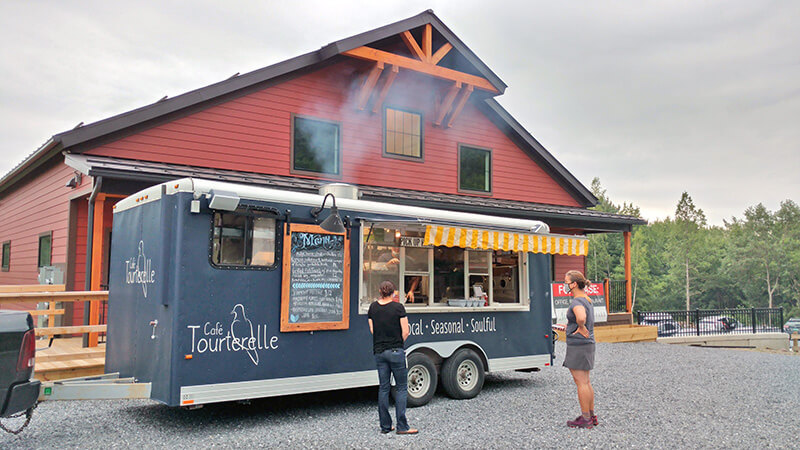Don’t despair, food trucks could still be there

Town and Charlotte Crossings work to resolve permit issues
Charlotte Crossings is at odds with the Town of Charlotte yet again, as the Route 7 property owners say they were “unexpectedly” asked to stop hosting food trucks in their parking lot this week. Town officials say the property owners were contacted on four separate occasions this spring and summer regarding permit violations; the owners of Charlotte Crossings say they never received those notices. Despite communication issues, both parties have expressed an interest in moving forward cooperatively.
Charlotte Crossings hosts office space, a retail store, and is permitted for a restaurant, though one does not currently operate at the property. Building owners Debra Kassabian and Mike Dunbar, through their company Gemini Properties, have been hosting food trucks at the property throughout the summer and on weekend nights host a Backyard Bistro operated outdoors by La Villa restaurant. Since the spring, they have allowed local food vendors to sell takeout meals from trucks and tents in the parking lot of the property.
Zoning Administrator Daniel Morgan said that the town originally allowed the food trucks to operate unpermitted starting in April because of the uncertainty surrounding the coronavirus pandemic and its potential impact on municipal offices and local businesses. “At the beginning of the shutdown in March, we had spoken over the phone, with the understanding that they would have a short-term temporary food truck on a somewhat irregular basis,” he said, “and if they wanted to make that a more permanent feature at Charlotte Crossings they could, but it would require further permitting and that could happen down the line.”
Morgan said the town contacted Kassabian and Dunbar four times via mail regarding not only the improperly permitted food trucks but six other site plan and Land Use Regulation violations surrounding an unapproved parking lot area.
“There was a letter on May 28, there was a letter on June 10, and then there was my letter of August 14, and finally my letter of August 26,” Morgan said; the Aug. 26 letter was the one Kassabian called “unexpected.” That letter informed Charlotte Crossings that a fine of $200 per day would be issued for every day that food trucks operated on the premises until proper permits are issued.
Kassabian said she never received the first two letters and that she believes they were sent to the wrong address. “There was nothing sent in May and June,” she said. “We never received anything…There were not four.” She said that dealing with the town on several issues over the past six months has been like “a black hole,” and that they are frustrated with what they perceive as a lack of response to routine questions about things like sign permits and revising their site plan.
Charlotte Crossings has been involved in another, separate conflict with the town regarding Land Use Regulations (LURs) related to the parking area at the property. Rather than resubmit a site plan for review once they decided to add additional parking in the front of the building, which is prohibited by current LURs, they petitioned to amend the current regulations. Their proposed amendment, along with many others, is currently in the approval process with the Planning Commission and will eventually be presented to voters at town meeting in March.
Kassabian wonders if this has something to do with the way the town approached the food truck permit problem. “It’s strange,” she said. “This is really strange behavior, it’s like passive-aggressive… If they want to work with us, they don’t need to come with guns blazing. They can just come around the corner and say, ‘Hey, you need a permit for this.’ Is it because we did the petition…is it because someone doesn’t like us?”
Morgan said that the zoning office, the Zoning Board of Administration, the Design Review Board and the Planning Commission are all eager and willing to come to an agreement with Charlotte Crossings. “I think where the disconnect came was when that original three months agreement ran out and the Crossings, unfortunately, had not come in for an application,” he said. “That’s all we’re really asking for, is for them to come before the Zoning Board and the Planning Commission and have everything permitted properly.”
With the same goal in mind—allowing food trucks to operate on the property for as long as weather permits—both Kassabian and Morgan expressed optimism that the problem can be solved. “I think it’ll all work out,” Kassabian said. “I’m definitely positive about this. We want a collaborative approach to this, and it sounds like they’re saying the same. We’re working hard to move forward.”
Legal counsel for Charlotte Crossings has been in touch with the zoning office, and Morgan said they are moving forward with the updated permitting process. “They have assured me that they’re preparing all necessary applications and materials to come before the Design Review Board in a joint hearing, and hopefully we can get that permit officially and effectively and within our regulations.”
He also said that the town is willing to go ahead and issue food truck-related permits before the other permitting violations are resolved. “We’re looking forward to working with them,” he said. “We’re hoping to go forth with a good faith approach.”
